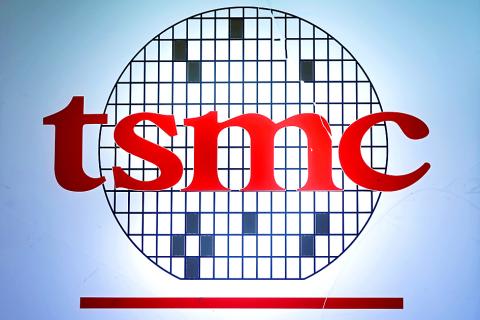Taiwan Semiconductor Manufacturing Co (TSMC, 台積電) yesterday said it would continue supplying wafers and technologies to Huawei Technologies Co (華為) as its exports are in full compliance with international trade rules, despite the US’ latest sanctions on the Chinese firm.
The chipmaker’s move came as a slew of global firms followed the lead of Aphabet Inc’s Google in cutting ties with the world’s No. 2 smartphone maker after Washington put Huawei on a blacklist.
TSMC, which counts Huawei among its top clients, said that it is the company’s long-term practice to conduct due diligence on every product it exports to make sure it is in compliance with international trade rules.

Photo: Reuters
“Based on our due diligence, we do not anticipate any major changes in how we ship wafers and how we deliver technologies to this client,” TSMC spokesperson Elizabeth Sun (孫又文) said on the sidelines of the chipmaker’s annual technology symposium in Hsinchu.
TSMC products contain less than 25 percent US-origin software and technology during the production process, Sun said, citing an internal assessment and an appraisal from an outside counsel from the US.
“We are our customers’ enabler. That includes HiSilicon Technologies Co (海思半導體),” Sun said.
HiSilicon helps design in-house premium mobile processors, including the Kirin family used in Huawei’s high-end smartphones.
TSMC said that some of it clients have said they would stop could lead to reduced orders from certain clients.
The company does not plan to revise down its second-quarter financial forecast.
It is sticking to its forecast of revenue growing at a quarterly pace of 7 percent this quarter.
TSMC said it does not plan to accelerate capacity expansion at its new factory in Nanjing to cope with the escalating US-China trade dispute.
Its goal is to boost annual capacity at the 12-inch fab to 15,000 wafers by the end of this year and to 20,000 wafers next year.
TSMC chief executive officer C.C.Wei (魏哲家) added that the company is committed to investing heavily in Taiwan.
Over the past five years, TSMC has spent US$50 billion on capacity expansion and technology development, he said.
This year, the company plans to invest between US$10 and US$11 billion on new facilities and equipment, which should increase total annual capacity by about 2 percent to 12 million wafers.
TSMC has started equipment installation at its Fab 18, paving the way for the company to produce the world’s first 5-nanometer chip in the first quarter next year.
The company has also earmarked a piece of land for next-generation 3-nanometer chips, Wei said.

In Italy’s storied gold-making hubs, jewelers are reworking their designs to trim gold content as they race to blunt the effect of record prices and appeal to shoppers watching their budgets. Gold prices hit a record high on Thursday, surging near US$5,600 an ounce, more than double a year ago as geopolitical concerns and jitters over trade pushed investors toward the safe-haven asset. The rally is putting undue pressure on small artisans as they face mounting demands from customers, including international brands, to produce cheaper items, from signature pieces to wedding rings, according to interviews with four independent jewelers in Italy’s main

Macronix International Co (旺宏), the world’s biggest NOR flash memory supplier, yesterday said it would spend NT$22 billion (US$699.1 million) on capacity expansion this year to increase its production of mid-to-low-density memory chips as the world’s major memorychip suppliers are phasing out the market. The company said its planned capital expenditures are about 11 times higher than the NT$1.8 billion it spent on new facilities and equipment last year. A majority of this year’s outlay would be allocated to step up capacity of multi-level cell (MLC) NAND flash memory chips, which are used in embedded multimedia cards (eMMC), a managed

Japanese Prime Minister Sanae Takaichi has talked up the benefits of a weaker yen in a campaign speech, adopting a tone at odds with her finance ministry, which has refused to rule out any options to counter excessive foreign exchange volatility. Takaichi later softened her stance, saying she did not have a preference for the yen’s direction. “People say the weak yen is bad right now, but for export industries, it’s a major opportunity,” Takaichi said on Saturday at a rally for Liberal Democratic Party candidate Daishiro Yamagiwa in Kanagawa Prefecture ahead of a snap election on Sunday. “Whether it’s selling food or

In the wake of strong global demand for AI applications, Taiwan’s export-oriented economy accelerated with the composite index of economic indicators flashing the first “red” light in December for one year, indicating the economy is in booming mode, the National Development Council (NDC) said yesterday. Moreover, the index of leading indicators, which gauges the potential state of the economy over the next six months, also moved higher in December amid growing optimism over the outlook, the NDC said. In December, the index of economic indicators rose one point from a month earlier to 38, at the lower end of the “red” light.